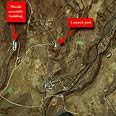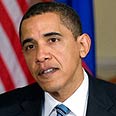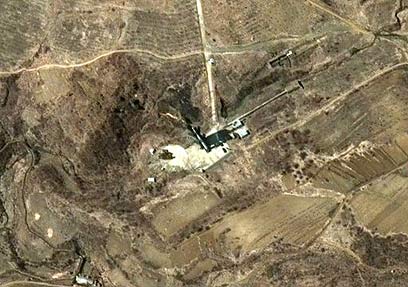

North Korea launched a long-range rocket over Japan on Sunday, drawing swift international condemnation and triggering an emergency meeting of the UN Security Council.
The state-run Korean Central News Agency said in a dispatch that the Kwangmyongsong-2 satellite is circling orbit after a successful launch. The report said the satellite was sent into space aboard a three-stage space launch vehicle
But the US military later disputed the claim, saying "the payload itself landed in the Pacific Ocean."
Washington said it would take steps to let the reclusive North know it could not threaten regional security. South Korea called the launch of the rocket, seen by many powers as a disguised missile test, a "reckless" act.
US President Barack Obama called for Pyonyang to refrain from further "provocative actions" and said its launch of a Taepodong-2 missile violated United Nations rules.
"With this provocative act, North Korea has ignored its international obligations, rejected unequivocal calls for restraint, and further isolated itself from the community of nations," Obama said in a statement released from Prague, where he is traveling.
Obama said the launch violated a UN Security Council resolution that prohibits North Korea from conducting ballistic missile-related activities of any kind.
"I urge North Korea to abide fully by the resolutions of the UN Security Council and to refrain from further provocative actions," he said.
Obama, who is on an eight-day visit to Europe, will call for the elimination of all nuclear weapons across the globe in a speech later on Sunday that he hopes will lend credibility to his message in atomic disputes with Iran and North Korea.
He said in the statement the United States was "fully committed" to maintaining security in northeast Asia and would continue work through the so-called six-party talks to ensure verified denuclearization of the Korean Peninsula.
Those talks group North and South Korea, China, Japan, Russia and the United States.
"North Korea has a pathway to acceptance in the international community, but it will not find that acceptance unless it abandons its pursuit of weapons of mass destruction and abides by its international obligations and commitments," Obama said.
The European Union said it strongly condemned North Korea's rocket launch and called on Pyongyang to suspend its ballistic missile and nuclear programmes.
"These actions place additional strains on regional stability at a time when the unresolved nuclear issue on the Korean Peninsula requires mutual confidence-building," the Czech EU presidency said in a statement.
It called on Korea to "immediately suspend all activities related to its ballistic missile programme and abandon all nuclear weapons and existing nuclear programmes in a complete, verifiable and irreversible manner."
UN Secretary-General Ban Ki-moon said that the rocket launch did not help efforts to secure regional peace and stability and urged Pyongyang to comply with Security Council resolutions.
"Given the volatility in the region ... such a launch is not conducive to efforts to promote dialogue, regional peace and stability," Ban said in a statement issued by his press office. "The Secretary-General urges (North Korea) to comply with relevant Security Council resolutions," the statement said.
Japan said it stopped monitoring the Taepodong-2 rocket after it had passed 2,100 kilometers (1,305 miles) east of Tokyo, indicating the launch had been a success. In its only previous test flight, in July 2006, the rocket blew apart 40 seconds after launch.

Launcing site (Photo: Reuters)
South Korea's Yonhap news agency quoted a government official in Seoul as saying the rocket appeared to have carried a satellite, which Pyongyang had insisted was its plan.
Japan's Chief Cabinet Secretary Takeo Kawamura said even if the object launched was a satellite, it would violate UN resolutions on North Korean ballistic missile activity.
In New York, Japan's UN ambassador requested an emergency meeting of the Security Council to discuss the launch. A diplomat said a meeting would be held later on Sunday.
"It is extremely regrettable that North Korea went ahead with the launch ... and we protest strongly," Kawamura said.
Analysts said the launch may help North Korean leader Kim Jong-il shore up support after a suspected stroke in August raised questions of his grip on power and bolster his hand in using military threats to win concessions from global powers.
The United States, South Korea and Japan had said the launch would actually be the test of the Taepodong-2, which is designed to carry a warhead as far as Alaska. It has an estimated range of 6,700 kilometers (4,200 miles).
Impoverished North Korea, which for years has used military threats to wring concessions from regional powers, has said it was putting a satellite into orbit as part of a peaceful space program and threatened war if the rocket was intercepted.
Boosters fall into ocean
Sunday was the second day in the April 4-8 timeframe the secretive North, which tested a nuclear device in 2006, had set for the launch.
The first rocket booster stage appeared to drop into the Sea of Japan, an estimated 280 kilometers (170 miles) west of the northern Japan coast, the prime minister's office said in a statement.
The second piece appeared to fall into the Pacific Ocean.
Stephen Bosworth, Washington's special envoy for North Korea, last week suggested the launch was a foregone conclusion and that he hoped to bring the North back to six-party talks on ending its nuclear programs once the "dust" had settled over the launch.
While saying the talks among the two Koreas, China, Japan, Russia and the United States were central to efforts to get North Korea to give up its nuclear program, he also said Washington was ready for direct contact with Pyongyang at any time.
The six-party talks stalled in December and Pyongyang has threatened to quit the dialogue if the United Nations imposes any punishment over its rocket launch.
US President Barack Obama, who is in Prague, is due to speak shortly on ridding the world of nuclear weapons.
The United States, Japan and South Korea will view the launch as a violation of a UN Security Council resolution passed in 2006 after Pyongyang carried out the nuclear test and other missile tests.
That resolution, number 1718, demands North Korea "suspend all activities related to its ballistic missile program".
UN Security Council diplomats have told Reuters on condition of anonymity that no country was considering imposing new sanctions but the starting point could be discussing a resolution for the stricter enforcement of earlier sanctions.
Both Russia and China, the latter the nearest the reclusive North has to a major ally, have made clear they would block new sanctions by the Council, where they have veto power.
The Associated Press and AFP contributed to this report















